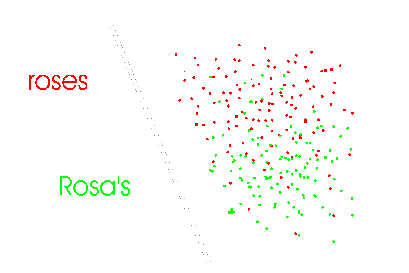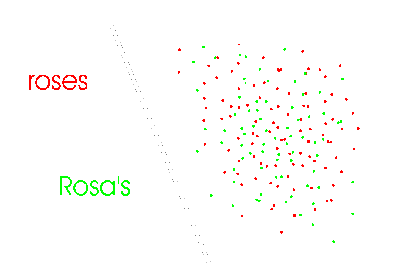 ].
The exceptions are
that final unstressed syllables can sometimes have full vowels
(e.g., potato) and [i] can often be unstressed even
in the middle of words (e.g., radiate).
].
The exceptions are
that final unstressed syllables can sometimes have full vowels
(e.g., potato) and [i] can often be unstressed even
in the middle of words (e.g., radiate).
 nænæ], you are claiming that all three vowels
are identical (except in loudness). Even in the slowest and most
careful pronunciations, this isn't true. What symbol should be
used instead?
nænæ], you are claiming that all three vowels
are identical (except in loudness). Even in the slowest and most
careful pronunciations, this isn't true. What symbol should be
used instead?
The short, sort of accurate, answer is: all unstressed
syllables in English have the
"schwa" [ ].
The exceptions are
that final unstressed syllables can sometimes have full vowels
(e.g., potato) and [i] can often be unstressed even
in the middle of words (e.g., radiate).
].
The exceptions are
that final unstressed syllables can sometimes have full vowels
(e.g., potato) and [i] can often be unstressed even
in the middle of words (e.g., radiate).
The longer, more accurate answer relies on the distinction between narrow and broad transcription.
Unstressed vowels in English are quite variable. The same
speaker will pronounce the vowel
[ ] in the
second syllable of
enough much the same way every time, but the schwa in the
first syllable can be pronounced very differently on different
occasions, sometimes even resembling full vowels like
[
] in the
second syllable of
enough much the same way every time, but the schwa in the
first syllable can be pronounced very differently on different
occasions, sometimes even resembling full vowels like
[ ],
[
],
[ ], or
[
], or
[ ]. [Note]
]. [Note]
 ].
].
 ],
even when this occurs in a stressed syllable.
This choice has the initial advantage for many
learners that all you have to do is turn the more familiar
"er" upside down. It has the disadvantage that it's not an
accurate reflection of what the mouth is doing. The consonant
[
],
even when this occurs in a stressed syllable.
This choice has the initial advantage for many
learners that all you have to do is turn the more familiar
"er" upside down. It has the disadvantage that it's not an
accurate reflection of what the mouth is doing. The consonant
[ ] is made
by curling the tongue tip upward. In a word like fur, the
tongue tip is already curled up by the end of the [f], usually
earlier. There is simply no slice of time between the [f] and the
[
] is made
by curling the tongue tip upward. In a word like fur, the
tongue tip is already curled up by the end of the [f], usually
earlier. There is simply no slice of time between the [f] and the
[ ] that we can
call a vowel.
] that we can
call a vowel.
One common solution to this problem is to transcribe the "er"
sound with the special IPA symbol
[ ].
Unfortunately, there are no special symbols to solve the similar problem with
[n], [l], and [m] -- for example, in normal speech there is simply no vowel
between the [t] and the [n] of button,
so transcribing the word as
].
Unfortunately, there are no special symbols to solve the similar problem with
[n], [l], and [m] -- for example, in normal speech there is simply no vowel
between the [t] and the [n] of button,
so transcribing the word as ![[b^t6n]](button1.gif) is pretty inaccurate.
We will return to this problem later in the course when we discuss
"syllabicity".
is pretty inaccurate.
We will return to this problem later in the course when we discuss
"syllabicity".
 The classical minimal pair to illustrate this distinction,
in dialects that make it, is roses versus
Rosa's. You could record a speaker of such a
dialect saying roses and Rosa's a hundred times
each and plot on a graph the position of the speaker's tongue during the
final vowel. There would be a large cloud of different positions
for roses and a large cloud of positions for Rosa's
-- there would be a large area where the two clouds overlapped,
but it would still be clear the clouds had different centres.
The classical minimal pair to illustrate this distinction,
in dialects that make it, is roses versus
Rosa's. You could record a speaker of such a
dialect saying roses and Rosa's a hundred times
each and plot on a graph the position of the speaker's tongue during the
final vowel. There would be a large cloud of different positions
for roses and a large cloud of positions for Rosa's
-- there would be a large area where the two clouds overlapped,
but it would still be clear the clouds had different centres.
 If you did the same graph for a speaker of a dialect that
doesn't make this distinction (like me), the two clouds would
overlap so much that there would be no justification for saying
that the two words had different vowels.
If you did the same graph for a speaker of a dialect that
doesn't make this distinction (like me), the two clouds would
overlap so much that there would be no justification for saying
that the two words had different vowels.
In transcribing roses and Rosa's, the difference between narrow and broad transcription is again relevant.
 oz
oz z].
z].
 ]:
Rosa's
[
]:
Rosa's
[ oz
oz z] and
roses
[
z] and
roses
[ oz
oz z].
z].
In my transcriptions, I will only use [ ] for
neutral unstressed vowels, i.e., for all unstressed vowels that
are not full vowels, like the [i] in happy or [o]
in potato. On assignments and tests, using schwa
in broad transcriptions will always be acceptable. It's also a
good habit to get into, as one way of unlearning habits that
might carry over from English spelling.
] for
neutral unstressed vowels, i.e., for all unstressed vowels that
are not full vowels, like the [i] in happy or [o]
in potato. On assignments and tests, using schwa
in broad transcriptions will always be acceptable. It's also a
good habit to get into, as one way of unlearning habits that
might carry over from English spelling.
 ] as
[
] as
[ ] in a
broad transcription is an easy trap to fall into if you are not
careful to pronounce the word with normal speed and normal
carefulness.
] in a
broad transcription is an easy trap to fall into if you are not
careful to pronounce the word with normal speed and normal
carefulness.